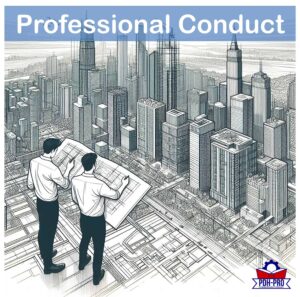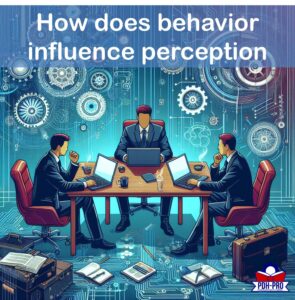Ethics and Professional Behavior
Table of Contents
Ethics and professional behavior are important concepts for professional engineers and the engineering profession.
Engineering ethics relates to the canon of ethics that all engineers agree to uphold. Professional behavior is the application of those ethical principles to our business and professional lives. The two terms are related, yet distinctly different.
As professional engineers, we’ve all heard these words a thousand times. Ethics and professional conduct in engineering are the lifeblood of what we do. Unless all engineers conduct themselves responsibly and professionally, the entire profession collapses.
Unsurprisingly, the concepts of professional conduct and ethics are often used interchangeably, when in fact, they are two separate, yet complementary concepts.
It’s easy to confuse ethics and professional conduct, and that’s why, we’ll be deep diving into both professional conduct and ethics. Dissecting the definition of each concept. What they are, what they aren’t, and how they work together to enhance the profession and create a safer society for every person.
What do we mean by “ethics”?
Ethics are, to put it simply, a code that engineers live by.
A code of ethics functions like a statement of values for a company or organization. In this case, it sets out the primary rules engineers adhere to in order to uphold and maintain safe environments for both engineers and the general public. Because the trust and confidence the public has in engineering rest upon complete adherence to ethical behavior, keeping this code is a major priority.
You know the general code of ethics. Make public health and safety your first priority, work only jobs you’re skilled in, public statements need to be truthful, avoid deception, make sure you act as a good representative of your clients or employers, and generally make sure you’re responsible and follow the law.
These are summarized, of course – the code of ethics for engineers is infinitely more nuanced, but it boils down to these simple tenants. They are what we form the basis of our behavior at work around, the text that we refer back to when making difficult decisions. A code of ethics defines what we, as a profession, are as a group.
Why are ethics important?
Learning about ethics can be boring, right? Because as engineers, and as people we like to think the best of ourselves. We all love to believe that we’re going to operate to the best of our ability and that we’re going to do the best job, every time. The code of ethics seems like the terms of service on a website, something we scroll past in order to get to the good stuff.
Unfortunately, situations can arise that put us in difficult situations. What happens when a cash-strapped civil engineer is offered a job creating something outside his expertise, and decides to take it for the money? Will the end product be of good quality, or even safe? What if money pressures cause cut corners, which cause unforeseen expenses in the future, that measure out not just in money, but in human lives?
To put it simply and brutally, if we don’t do our jobs by the code of ethics set down, somewhere, someone down the line may have their lives put at risk, and there’s no corner cut that’s worth someone’s death.
Can ethics be learned?
At first glance, a code of ethics reads like a list of personality traits, doesn’t it? “Be good, don’t lie, be honest, be responsible.”
These traits do come easier to some than to others, and it has raised the question in the past – is being ethical a personality trait? Can a person really be taught to adhere to ethical principles? When faced with opposing personality types, it can seem like some people just can’t be taught. After all, it seems that deep down, adhering to ethics is a personal choice that has to be made.
There are arguments, though, that could be made on the teaching of ethical behavior. It’s not just an ingrained sense of morality that gives us the need for adherence to ethics, but self-preservation of the profession itself. If we are not ethical, public trust is lost, and without public trust, engineering as a profession is deeply in trouble. If ethics is taught as a method of self-preservation, it no longer becomes a gamble on the depth of an individual’s moral compass, but a sound survival strategy in an ever-changing and chaotic professional landscape.
What is professional conduct? 
Now that we’ve discussed in-depth what ethics are, let’s take a look at professional conduct.
A code of professional conduct and a code of ethics are often confused, but in actuality, professional conduct is the real-life application of a code of ethics. Whereas a code of ethics is a document to reference when considering decision-making, rules dictating professional conduct are guidelines around specific actions that must be taken. Think of ethics as the trunk of a tree, and professional conduct as all the different branches that grow off that tree. There are many different paths they can take, but they all begin rooted in a code of ethics.
Professional conduct is defined as specific actions that are taken in order to adhere to the code of ethics set forth by your organization.
What are some examples of professional conduct?
If professional conduct is the execution of the code of ethics, what does it look like?
Some examples would be having a policy of full disclosure when it comes to your qualifications, making sure your client knows that you are certified to work on the project you are being hired for. Your code of conduct may include a clause about operating without bias as regards to race, gender, class, or sexual orientation. In the spirit of acting responsibly, a code of conduct may lay out guidelines for accountability when it comes to project deadlines and transparency with your client.
Professional conduct is a specific action in your code of conduct that is in the spirit of keeping with a larger code of ethics. Where ethical conduct is the theoretical ideals, professional conduct is the practical path to fulfilling those ideals.
How does behavior influence perception?
 It may seem like a small concern to worry about little things like how you dress or whether or not your client knows every detail of your credentials, but in this field more than any other, an engineer or group of engineers (or in fact the whole lot of us) can be made or broken by reputation. The more you see your reputation as an asset you must invest in and grow, the more you will succeed.
It may seem like a small concern to worry about little things like how you dress or whether or not your client knows every detail of your credentials, but in this field more than any other, an engineer or group of engineers (or in fact the whole lot of us) can be made or broken by reputation. The more you see your reputation as an asset you must invest in and grow, the more you will succeed.
You may think a dress code is a small thing, but dressing and acting professionally can grow your impression as responsible and reliable. Going out of your way to disclose your qualifications paints you – and your company – as honest and trustworthy. Ensuring transparency through every step of the process gives your client faith that the job is being done right. Through all of these small actions, you are painting a larger picture of yourself as someone the client can trust.
On the flip side of that, if the client meets a representative in sloppy dress, finds out that you were not qualified for the job in the first place, and is never updated on the progress of the job, this leaves them feeling off-balance, and like they can’t trust you. You aren’t likely to be called on again, and worst of all – the client will spread the experience, and you’ll no longer find work.
What is the benefit of requiring professional conduct and ethics?
Requiring both ethics and professional conduct requires knowledge of the difference between the two. When you require adherence to ethical conduct, the professional conduct will make more sense to those who follow it, because they will be able to reason the logic behind the rules for things like dress code and credential disclosure. If a person only knows that they must dress a certain way, but not why, they may be tempted to buck the rules and not follow codes of professional conduct.
If they know the ethics behind the conduct, they may be more likely to dress and act more professional.
On the reverse side, professional conduct offered alongside codes of ethics gives an engineer concrete ways to abide by laws of ethics. Without professional conduct, ethics rules may seem vague and up to interpretation, or so simple and straightforward that they can appear meaningless or pointless. Codes of conduct offer practical application where ethics does not.
Ultimately, one should not be required without the other, because ethics and professional conduct go hand in hand for engineers, each one making the other more understandable and attainable, and enriching our profession for everyone.
The Paramountcy Principle
The Paramountcy Principle is a thing we’ve all heard one way or another. In essence, it states that we should put the public welfare above all else.
“Engineers, in the fulfillment of their professional duties, shall hold paramount the safety, health and welfare of the public.”
This principle is foundational because it puts in plain words the thing our entire profession relies on: the public welfare. We, arguably more than any other profession – even doctors – hold the public welfare in our hands. It’s because of us that they believe roads are safe, trust the floors beneath their feet to hold them up, and feel safe knowing that their homes and sound and reliable. If we cannot be trusted for this, then our profession is useless.
In many ways, the Paramountcy Principle can be regarded as the place where all ethics codes begin. Every code of ethics for every organization has this at its heart.
The Paramountcy Principle and Engineering Codes
In fact, did you know? Most engineering organizations include the Paramountcy Principle in some form or fashion right in their ethics codes. It can be worded differently, sure, but here are a few examples of the Paramountcy Principle in action.
The Association for Computing Machinery states that “the public good is the paramount consideration”.
The American Institute of Chemical Engineers lists its first rule in its code of ethics as, “Hold paramount the safety, health, and welfare of the public and protect the environment in performance of their professional duties.”
At the Institute of Electrical and Electronics Engineers, they include the Paramountcy Principle at the very beginning as well. In their code of ethics, it’s stated as follows: “To hold paramount the safety, health, and welfare of the public, to strive to comply with ethical design and sustainable development practices, and to disclose promptly factors that might endanger the public or the environment.”
How is this principle relevant?
We’ve established that the Paramountcy Principle is necessary and that it’s used as the first line of defense in almost every single engineering ethics code. But let’s break down what it means for ethics, and how it relates to the expression of ethics and professional conduct.
What is “upholding the public welfare”? At first glance, it seems obvious. The public is…everyone. So clearly the rule is just talking about keeping the common good in mind when conducting yourself and your business practices, right?
Well, yes. But there may be a few hidden implications that not many think about. The public good doesn’t just include now, and some interpretations of the Paramountcy Principle definitely do include not just the present public, but the future public as well. This means that not only should we be designing and building for the present, but for the future. This brings environmental concerns to light, and makes us think about the long-term sustainability and impact of what we do.
The whole of the Paramountcy Principle is the present with an eye towards the future. That means our ethics codes, and the corresponding codes of professional conduct we create around them, must put people, present and future, at their core. We’ll find ourselves not only with professional dress codes that relay trustworthiness, but also environmental policies and responsible energy usage concerns. Professional conduct will include things honestly and objectively reporting on environmental impact studies and surveying populations to better know their needs, and the needs of their children.
In one simple concept, the Paramountcy Principle breaks engineering down to a single product. We’re not just engineering buildings, machines, chemical products, cities. We’re engineering the future.
Ethics and Professional Conduct – Similar yet Distinct
Ethics are good, but they’re useless without practical application, and along the same vein, professional conduct rules make no sense without the backbone of ethics. Hopefully, we’ve reached a better understanding of these two vital principles, and how, as engineers, they are our first and foremost tool when it comes to shaping our profession. These aren’t just some rules we learn about in a class and then forget about – a code of ethics tells us what kind of engineers we’re going to be, and professional conduct is the roadmap to how we get there.
Take these two tools with you, and not only will you be a better engineer, but you’ll also be a better person, too.
